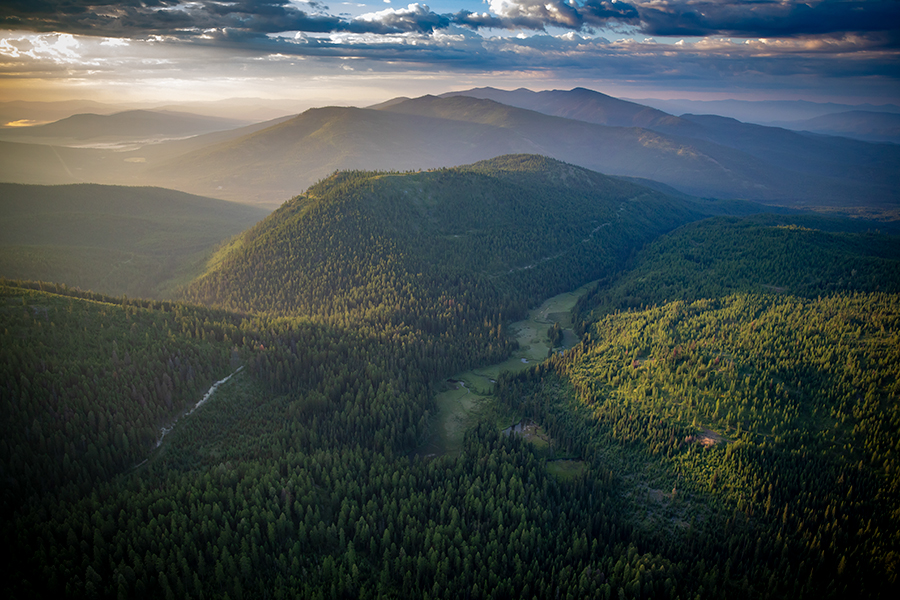In Montana, Support for Conservation Remains Rocky Mountain High
13th-annual Conservation in the West poll reveals steady support among voters even as concerns spike over cost of living and water shortages
By Tristan Scott
A new poll reveals that support for conservation policies remains strong among Montanans, outweighing concerns surrounding the escalating cost of living, as well as worries over drought and water shortages.
That’s according to Colorado College’s 13th-annual State of the Rockies Project Conservation in the West Poll, which was released Feb. 15 and surveyed the views of Montanans and voters in seven other states — Arizona, Colorado, Idaho, Nevada, New Mexico, Utah, and Wyoming.
The polling results showed support in the 60-90% range for conservation goals like protecting wildlife habitats and migration routes, ensuring healthier forests, preventing light pollution that blocks out the stars, and safeguarding drinking water. The results revealed that 77% of Montanans support achieving a national goal of conserving 30% of land and inland U.S. waters by the year 2030. To further conservation progress, 82% of Montanans surveyed said they support presidents continuing to use their ability to designate existing public lands as national monuments to maintain public access and protect the land and wildlife for future generations.
Still, voters expressed higher levels of concern than in the past over several pressing issues that impact western lifestyles. Asked what they consider to be extremely or very serious problems for their state, 37% of Montanans pointed to inadequate water supplies, 56% said drought, 46% said the low level of water in rivers, 83% named the rising cost of living, and 49% said the price of gasoline.
“Those spiking concerns, however, are not dampening enthusiasm for conservation action in Montana,” according to a press release announcing the results.
To that end, support remains high for a range of policies aimed at protecting land, water, air and wildlife. According to the results: 86% of Montanans support constructing wildlife crossing structures across major highways that intersect with known migration routes; 78% support creating new national parks, national monuments and national wildlife refuges and Tribal protected areas to protect historic sites or areas of outdoor recreation; 55% support gradually transitioning to 100% of energy being produced from clean, renewable sources like solar and wind over the next ten to fifteen years; 75% support directing funding to ensure adequate access to parks and natural areas for lower-income people and communities of color that disproportionately lack them; 80% support ensuring Native American tribes have greater input into decisions made about areas on national public lands that contain sites sacred or culturally important to their Tribe; 84% support enacting the Blackfoot Clearwater Stewardship Act to ensure hunting and fishing access, protect stream flows into the Blackfoot River, and add 80,000 acres of new protected public lands for recreation areas, along with timber harvest and habitat restoration.
“This year voters in Montana have a lot on their minds, but they are not willing to trade one priority for another,” said Katrina Miller-Stevens, director of the State of the Rockies Project and an associate professor at Colorado College. “High gas prices, increasing costs of living, and water shortage concerns are not enough to move Montanans to reconsider their consistent support for conservation policies or seek out short-sighted solutions that put land and water at risk. In fact, people in Montana want to continue our progress to protect more outdoor spaces.”
The level of concern among Montanans around water issues remains high in this year’s poll despite a notable uptick in winter precipitation across the West. Those concerns correspond with an increasing awareness of the devastating consequences of drought in other western states, as well as prolonged and more intense wildfire seasons.
The 2023 Colorado College Conservation in the West Poll is a bipartisan survey conducted by Republican pollster Lori Weigel of New Bridge Strategy and Democratic pollster Dave Metz of Fairbank, Maslin, Maullin, Metz & Associates. The survey is funded by the William and Flora Hewlett Foundation.
The poll surveyed at least 400 registered voters in each of the eight western states for a total 3,413-voter sample, which included an over-sample of Black and Native American voters. The survey was conducted between Jan. 5 and Jan. 22. The poll’s effective margin of error is +2.4% at the 95% confidence interval for the total sample, and, at most, +4.9% for each state.
The full survey and individual state surveys are available on the State of the Rockies website.